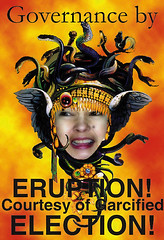Of food and jobs and constant hunger
The latest self-rated hunger statistics released by the Social Weather Stations (SWS) reveal a disquieting fact: one out of every five Filipinos currently suffers from moderate to severe hunger. Disturbingly, this has been the annual average for the past 3-4 years. As Mahar Mangahas recently put it, this figure (19%) constitutes a kind of hunger “plateau.” Why can we not seem to drop below this number?
The SWS uses a simple, effective method: surveying hunger household by household, asking if and, if so, how often, a surveyed family was hungry and had nothing to eat. Though this method (useful to the degree that we consider anything “self-rated” to be genuinely empirical) may reveal the current state of the problem, it also suggests that the causes of persistent hunger are far more complex than the figures themselves reveal.
Fortunately, other food insecurity statistics provide richer detail. A 2008 survey from the Food and Research Institute at the Department of Science and Technology suggests that nearly 73% of those surveyed felt insecure about household food supplies. Over half reported not having enough food for their children, let alone being able to afford nutritionally adequate food. To cope, 68% borrowed money (mostly from relatives), 63% purchased their food on “utang” (debt), 53% borrowed food, and 48% reduced food portions overall, while 46% reduced adult portions in favor of their children. In a world where many readers are more familiar with calorie-counting diets, weight-reduction spas and gym memberships, these food insecurity statistics are deeply sobering.
Dr. Dennis Mapa contends that the wild fluctuations of moderate hunger statistics are mainly caused by food price inflation and underemployment: “A one-time increase in food prices can lead to increases in hunger incidence that will last for five quarters, while a one-time increase in underemployment will lead to increases in hunger incidence for two quarters.” This is actually not as counter intuitive as it might sound: unemployed people ultimately have a “cushion” (savings, family, friends) that allows them to remain unemployed for a period; in fact, the more telling marker for the desperation that haunts genuine hunger appears to be underemployment itself. An overqualified person, when hungry and desperate, will take whatever job s/he can get just to hold his/her family together. Thus, Mapa stresses the need for better and more secure jobs through an improved investment climate based on stable, government policies and decreased corruption and red tape.
Though underemployment is the more intractable problem, food inflation has a greater effect on hunger in the medium-term. Dr. Arsenio Balisacan attributes food shocks to decreased rice harvests, international financial instability and frequent typhoons. DSWD Secretary Dinky Soliman has attributed the “bounce” in Luzon’s hunger figures to this year’s typhoons, where displaced and impoverished families are susceptible to moderate hunger because of the destruction of much of Luzon’s rice crop -- and to increased fuel prices, which are affected by the international financial market.
Of course, it should be noted that enormous differences in hunger incidence exist from province to province. According to SWS, Luzon (outside NCR) has the highest hunger levels (28%), while the Food Insecurity and Vulnerability Information and Mapping System of the National Nutrition Council (NNC) indicates that 13 of the 17 least vulnerable provinces are also in Luzon. This demonstrates how heterogeneous Luzon can be. In comparison, hunger figures have gone down significantly in the Visayas and Mindanao, although it is still too soon to tell if this is because of the recent influx of conditional cash transfer (CCT) funding in these regions.
The Aquino administration’s anti-poverty strategy prioritizes helping the poorest of the poor. To achieve this, the Human Development and Poverty Reduction Cabinet Cluster has crafted several medium- and long-term strategies that take many of these unpredictabilities into account. The CCT’s long-term goal is to improve education and family health so the inter-generational cycle of poverty can be broken. The National Anti-Poverty Commission is now focusing on the country’s 609 poorest municipalities. The Department of Labor and Employment continues to seek options for both the unemployed and the underemployed, despite global events like Arab Spring, Saudification, travel bans for our workers and natural disasters in receiving countries – all of which have contributed to job losses for our nationals abroad. The Department of Health’s Botika ng Barangay and Doctors-to-the-Barrio programs are keyed to improving the general state of health among the poorest and most marginalized. Meanwhile, NNC is now the lead agency of the Integrated Action for Hunger Alleviation and Improved Nutrition (HAIN), which integrates feeding and rice distribution for disaster victims and internally displaced persons. It also generates livelihood opportunities and infrastructure support to calamity-stricken areas, where the timely deployment of resources can help avoid destructive coping mechanisms (selling agricultural work animals or withdrawing children from school so they can work) that are ultimately poverty traps in the long-term.
Battling food price volatility and underemployment will require extended efforts in health, education, population growth, infrastructure and the creation of better jobs, especially for victims of disasters and calamities -- all of which require stronger economic growth. Because of this, the Economic Cluster continues to work on growth and strengthening our investment climate. This will allow us to counter shock factors that are beyond national control, such as petroleum prices, international finance and consumer demand, climate change and other natural disasters.
Another source of concern: in Mindanao, hunger alleviation programs have witnessed significant developments, but these short-term victories could be in trouble due to the latest round of hostilities in the region. According to Sec. Soliman, internally displaced persons who are currently registered continue to receive CCT funding, and the NNC is now seeing to their nutritional needs. But it is clear that medium- and long-term hunger alleviation goals will suffer greatly should these hostilities spread. Although justice should be strictly meted out to the perpetrators of violence in Basilan and elsewhere, a nation verging on solutions to the hunger of so many for the first time in decades can ill afford another all-out war.
Lila Ramos Shahani is Assistant Secretary of the National Anti-Poverty Commission.
The SWS uses a simple, effective method: surveying hunger household by household, asking if and, if so, how often, a surveyed family was hungry and had nothing to eat. Though this method (useful to the degree that we consider anything “self-rated” to be genuinely empirical) may reveal the current state of the problem, it also suggests that the causes of persistent hunger are far more complex than the figures themselves reveal.
Fortunately, other food insecurity statistics provide richer detail. A 2008 survey from the Food and Research Institute at the Department of Science and Technology suggests that nearly 73% of those surveyed felt insecure about household food supplies. Over half reported not having enough food for their children, let alone being able to afford nutritionally adequate food. To cope, 68% borrowed money (mostly from relatives), 63% purchased their food on “utang” (debt), 53% borrowed food, and 48% reduced food portions overall, while 46% reduced adult portions in favor of their children. In a world where many readers are more familiar with calorie-counting diets, weight-reduction spas and gym memberships, these food insecurity statistics are deeply sobering.
Dr. Dennis Mapa contends that the wild fluctuations of moderate hunger statistics are mainly caused by food price inflation and underemployment: “A one-time increase in food prices can lead to increases in hunger incidence that will last for five quarters, while a one-time increase in underemployment will lead to increases in hunger incidence for two quarters.” This is actually not as counter intuitive as it might sound: unemployed people ultimately have a “cushion” (savings, family, friends) that allows them to remain unemployed for a period; in fact, the more telling marker for the desperation that haunts genuine hunger appears to be underemployment itself. An overqualified person, when hungry and desperate, will take whatever job s/he can get just to hold his/her family together. Thus, Mapa stresses the need for better and more secure jobs through an improved investment climate based on stable, government policies and decreased corruption and red tape.
Though underemployment is the more intractable problem, food inflation has a greater effect on hunger in the medium-term. Dr. Arsenio Balisacan attributes food shocks to decreased rice harvests, international financial instability and frequent typhoons. DSWD Secretary Dinky Soliman has attributed the “bounce” in Luzon’s hunger figures to this year’s typhoons, where displaced and impoverished families are susceptible to moderate hunger because of the destruction of much of Luzon’s rice crop -- and to increased fuel prices, which are affected by the international financial market.
Of course, it should be noted that enormous differences in hunger incidence exist from province to province. According to SWS, Luzon (outside NCR) has the highest hunger levels (28%), while the Food Insecurity and Vulnerability Information and Mapping System of the National Nutrition Council (NNC) indicates that 13 of the 17 least vulnerable provinces are also in Luzon. This demonstrates how heterogeneous Luzon can be. In comparison, hunger figures have gone down significantly in the Visayas and Mindanao, although it is still too soon to tell if this is because of the recent influx of conditional cash transfer (CCT) funding in these regions.
The Aquino administration’s anti-poverty strategy prioritizes helping the poorest of the poor. To achieve this, the Human Development and Poverty Reduction Cabinet Cluster has crafted several medium- and long-term strategies that take many of these unpredictabilities into account. The CCT’s long-term goal is to improve education and family health so the inter-generational cycle of poverty can be broken. The National Anti-Poverty Commission is now focusing on the country’s 609 poorest municipalities. The Department of Labor and Employment continues to seek options for both the unemployed and the underemployed, despite global events like Arab Spring, Saudification, travel bans for our workers and natural disasters in receiving countries – all of which have contributed to job losses for our nationals abroad. The Department of Health’s Botika ng Barangay and Doctors-to-the-Barrio programs are keyed to improving the general state of health among the poorest and most marginalized. Meanwhile, NNC is now the lead agency of the Integrated Action for Hunger Alleviation and Improved Nutrition (HAIN), which integrates feeding and rice distribution for disaster victims and internally displaced persons. It also generates livelihood opportunities and infrastructure support to calamity-stricken areas, where the timely deployment of resources can help avoid destructive coping mechanisms (selling agricultural work animals or withdrawing children from school so they can work) that are ultimately poverty traps in the long-term.
Battling food price volatility and underemployment will require extended efforts in health, education, population growth, infrastructure and the creation of better jobs, especially for victims of disasters and calamities -- all of which require stronger economic growth. Because of this, the Economic Cluster continues to work on growth and strengthening our investment climate. This will allow us to counter shock factors that are beyond national control, such as petroleum prices, international finance and consumer demand, climate change and other natural disasters.
Another source of concern: in Mindanao, hunger alleviation programs have witnessed significant developments, but these short-term victories could be in trouble due to the latest round of hostilities in the region. According to Sec. Soliman, internally displaced persons who are currently registered continue to receive CCT funding, and the NNC is now seeing to their nutritional needs. But it is clear that medium- and long-term hunger alleviation goals will suffer greatly should these hostilities spread. Although justice should be strictly meted out to the perpetrators of violence in Basilan and elsewhere, a nation verging on solutions to the hunger of so many for the first time in decades can ill afford another all-out war.
Lila Ramos Shahani is Assistant Secretary of the National Anti-Poverty Commission.
*******************************************************
 LILA Shahani - I grew up in the Philippines, Romania, Australia, Austria, Kenya and India. I did my undergrad at Brown and went to the Fletcher School of Law and Diplomacy at Tufts for my MA. Places of work: CCP, UP, Oxford University Press, UNICEF and UNDP. I'm currently an editor for the UN in NY and also a doctoral candidate at Oxford. This article by Sylvia Mayuga might explain a little about some of the more impalpable stuff: please click here. Meanwhile, this is the short, online version of a recent book on Amartya Sen and human development that I co-edited; the authors were primarily Oxford scholars.
LILA Shahani - I grew up in the Philippines, Romania, Australia, Austria, Kenya and India. I did my undergrad at Brown and went to the Fletcher School of Law and Diplomacy at Tufts for my MA. Places of work: CCP, UP, Oxford University Press, UNICEF and UNDP. I'm currently an editor for the UN in NY and also a doctoral candidate at Oxford. This article by Sylvia Mayuga might explain a little about some of the more impalpable stuff: please click here. Meanwhile, this is the short, online version of a recent book on Amartya Sen and human development that I co-edited; the authors were primarily Oxford scholars.
POGB will not sell, exchange, use or allow any 3rd party access to your email for
any other purposes without exception, email exclusively for article updates only.
























1 Speak Out:
Under ordinary circumstance in poverty stricken Philippines food, jobs, & constant hunger gets exacerbated when conflicts are intensified. With war a big number of poor people will not just worry about food, job & hunger but also deal with the risk and danger of getting maimed or killed, kidnapped or used as hostage, and worse getting displaced.
Post a Comment